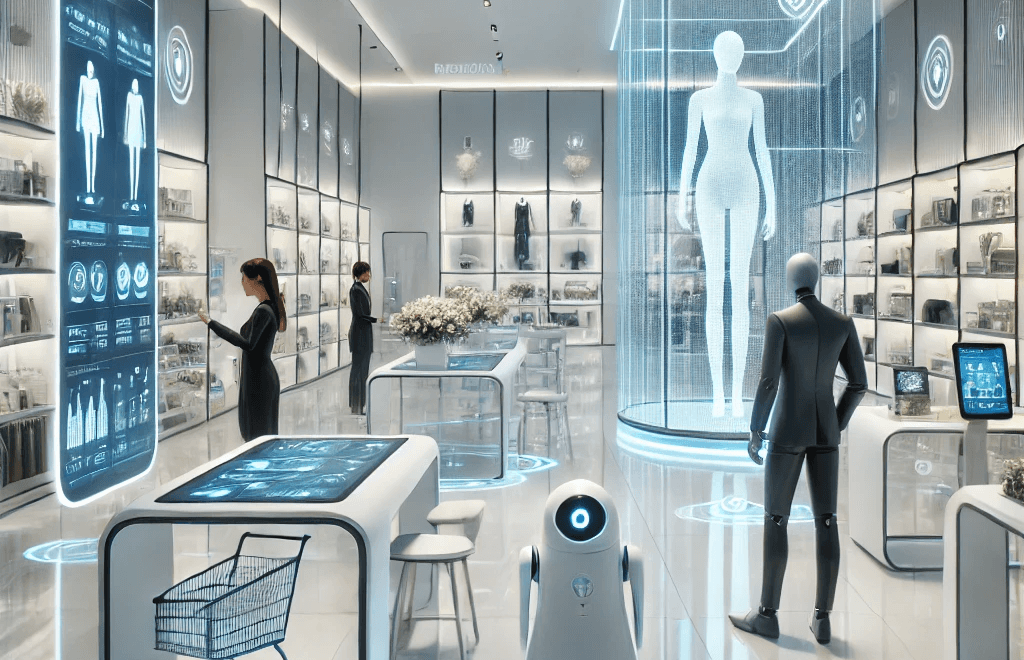Support center +91 97257 89197
Generative AI developmentAugust 6, 2024
How AI is Driving the Future of Retail: Smart Stores and Beyond

Artificial Intelligence (AI) is reshaping industries globally, and retail is no exception. From streamlining operations to enhancing customer experiences, AI's influence is evident across the retail landscape. The rise of smart stores represents a significant leap, where advanced technologies like AI, machine learning, and the Internet of Things (IoT) converge to transform traditional shopping environments into intelligent, automated spaces. But the revolution doesn't stop at smart stores—AI's impact on retail is far-reaching, driving changes in e-commerce, supply chain management, and even sustainability efforts. In this blog, we’ll explore how AI is driving the future of retail and what lies beyond the advent of smart stores.
The Concept of Smart Stores: AI at the Forefront
What Are Smart Stores?
Smart stores are a new breed of retail spaces where cutting-edge technology meets physical shopping environments. These stores use AI to create a more efficient, personalized, and seamless shopping experience for consumers. By leveraging sensors, data analytics, computer vision, and IoT devices, smart stores automate many traditional processes. From inventory management to checkout, AI handles it all, freeing up human staff for higher-level tasks like customer interaction and strategy.
AI-Driven Personalization
One of the standout features of AI in smart stores is its ability to deliver highly personalized shopping experiences. Through AI algorithms that analyze a shopper's past purchases, preferences, and real-time behaviors, smart stores can provide tailored product recommendations, customized promotions, and a unique in-store experience. Whether it's suggesting complementary products or offering discounts based on shopping habits, AI ensures that no two shopping trips are the same.
For instance, imagine walking into a smart store where AI-powered digital kiosks greet you by name, offer product suggestions, and even guide you to the exact aisle where your desired products are located. This hyper-personalized service is quickly becoming the new standard for customer engagement in retail.
AI for Inventory Management
Retailers have long struggled with keeping shelves stocked efficiently. AI solves this problem by predicting demand, automating restocking, and monitoring inventory in real-time. Traditional inventory management relies on manual tracking, often leading to errors, overstock, or stockouts. In contrast, AI uses data from sales trends, historical performance, and external factors like weather or events to predict which products will be needed and when. This ensures that the right products are available at the right time, reducing waste and increasing efficiency.
Retail giants like Walmart have already embraced AI for inventory management, using machine learning algorithms to forecast demand and optimize stock levels. With real-time tracking of products and automated reordering systems, AI ensures smoother operations for retailers and a better shopping experience for customers.
Case Studies: AI in Action
One of the most prominent examples of smart stores is Amazon Go, which uses AI, computer vision, and machine learning to create a cashier-less shopping experience. Shoppers can simply walk in, pick up the items they want, and walk out. Sensors and AI-powered cameras automatically detect which products are taken, charging customers via their Amazon accounts. This not only eliminates the need for traditional checkout lines but also showcases the potential for AI to revolutionize the way we shop.
Another interesting case is Alibaba’s Hema stores, which integrate online and offline shopping. Customers can use the Hema app to browse items, place orders for delivery, or scan products in-store for detailed information. AI in Hema stores handles everything from inventory management to personalized promotions, making the shopping experience more interactive and efficient.
AI-Powered Customer Service: From Chatbots to Virtual Assistants
AI Chatbots in Retail
Customer service is a key area where AI shines, particularly through chatbots. AI chatbots provide 24/7 support, helping customers with inquiries, order tracking, product searches, and even returns. Unlike traditional customer service, which can be limited by hours of operation and staffing, AI chatbots are always available and increasingly sophisticated.
For example, Sephora’s AI-powered chatbot helps customers find beauty products, provides skincare advice, and even suggests makeup tutorials based on the products they've purchased. Similarly, Shopify’s Kit chatbot assists e-commerce store owners in managing marketing campaigns, automating tasks like creating ads or sending updates to customers.
Virtual Shopping Assistants
Voice assistants like Amazon Alexa, Google Assistant, and Apple’s Siri are also playing a growing role in retail. These virtual assistants can help shoppers browse products, create shopping lists, and even place orders—all via voice commands. Retailers are increasingly integrating these assistants into their platforms, allowing customers to shop hands-free and efficiently.
In addition to voice-based assistants, virtual shopping assistants powered by AI can guide customers through online stores, offering product suggestions based on preferences and past behaviors. This level of personalization elevates the shopping experience, making it easier for customers to find exactly what they’re looking for without sifting through endless product listings.
AI-Enabled Augmented Reality (AR)
One of the most exciting applications of AI in retail is the integration of augmented reality (AR) to enhance the shopping experience. AR allows customers to virtually try on products, such as clothing, makeup, or accessories, without physically interacting with them. This technology is particularly useful for online shoppers, who often face uncertainty about how products will look or fit.
For instance, IKEA’s AR app, IKEA Place, lets customers visualize how furniture would look in their homes by placing virtual models of products in their real-world spaces. Similarly, L’Oréal’s AI-powered AR tools allow customers to try on makeup virtually, using their smartphone cameras. These AR experiences not only enhance customer satisfaction but also reduce the likelihood of returns, benefiting both shoppers and retailers.
Enhancing In-Store Experiences with AI
AI for Visual Search and Product Discovery
AI's capability to perform visual search is transforming how customers discover products. Shoppers can now upload images of items they’re interested in, and AI will find visually similar products in-store or online. This technology allows customers to seamlessly translate inspiration from social media, websites, or even a friend’s outfit into actionable purchases.
Retailers like ASOS and Target have incorporated AI-powered visual search into their apps, enabling customers to snap a picture of an item they like and quickly find similar products available for purchase. This feature enhances product discovery and offers a more engaging shopping experience.
Computer Vision for Autonomous Checkout
AI’s ability to automate checkout processes through computer vision technology is revolutionizing the way we shop in physical stores. Computer vision systems, equipped with cameras and sensors, can identify what products customers are picking up, eliminating the need for traditional checkout lines.
Stores like Amazon Go and AiFi are leading the charge, allowing customers to simply grab what they need and walk out. The AI systems automatically charge their accounts, creating a frictionless shopping experience. This not only reduces wait times but also increases store efficiency by minimizing the need for staff to handle checkout duties.
AI-Powered Promotions and Dynamic Pricing
AI is also helping retailers maximize profits through dynamic pricing and personalized promotions. By analyzing data such as customer behavior, market demand, competitor pricing, and even external factors like weather, AI can adjust prices in real-time to ensure competitiveness and optimize sales.
For example, Zara uses AI to adjust prices based on inventory levels, demand, and the time of season. Additionally, AI can generate personalized discounts for loyal customers or those likely to abandon their carts, encouraging them to complete their purchases. This data-driven approach not only improves sales but also fosters customer loyalty.
AI’s Role in E-Commerce and the Future of Retail
While AI is making waves in physical retail through smart stores, its impact on e-commerce is equally transformative. Online shopping platforms are leveraging AI to enhance everything from customer experiences to backend operations, ultimately redefining how consumers interact with brands.
AI in E-Commerce Optimization
E-commerce businesses are harnessing AI for website personalization, providing tailored shopping experiences based on individual user behavior. AI algorithms track browsing habits, past purchases, and even the amount of time a customer spends looking at a particular product, allowing e-commerce platforms to suggest items that align with the shopper's interests.
Amazon is a prime example of this technology in action. With millions of customers worldwide, Amazon’s AI engine offers personalized product recommendations, ensuring that customers see products they are most likely to purchase. These recommendations are often based on sophisticated machine learning models that analyze browsing patterns and correlate them with other users’ preferences.
In addition to personalization, AI is crucial in fraud detection. E-commerce platforms must protect their customers and transactions, and AI helps by identifying suspicious behavior in real-time. For instance, if a customer’s transaction deviates significantly from their usual buying patterns, AI can flag the transaction for further review, preventing potential fraud.
Predictive Analytics in E-Commerce
Predictive analytics is a cornerstone of AI-driven e-commerce. By using historical data, AI can forecast future shopping trends, predict demand for specific products, and even estimate the likelihood of a customer making a purchase. This allows retailers to optimize inventory, pricing, and marketing strategies.
For example, retailers can adjust their marketing campaigns in real-time based on AI’s predictions about which products will be popular during specific times of the year. This reduces the guesswork in sales strategies and leads to more targeted advertising efforts, ultimately boosting revenue.
AI and the Future of Omnichannel Retail
As retail continues to evolve, the line between online and offline shopping experiences is blurring. AI plays a key role in creating omnichannel retail experiences, where customers seamlessly transition between digital and physical platforms. Whether a shopper starts browsing online and finishes their purchase in-store, or vice versa, AI ensures a consistent and personalized journey.
Integrating AI Across Channels
Retailers are increasingly using AI to integrate their e-commerce platforms with their physical stores. For instance, a customer may receive personalized product recommendations online based on their in-store browsing history. AI-powered loyalty programs track customer interactions across all channels, ensuring that the same level of personalization is applied no matter where the customer engages with the brand.
Brands like Nike and Sephora excel at this by using AI to connect their digital and physical retail channels. A customer might try a product in-store, receive personalized follow-up recommendations via email, and then complete their purchase through the brand’s app—all of which is made possible by AI-driven data analytics.
AI-Driven Inventory and Fulfillment
AI also optimizes the inventory and fulfillment processes for omnichannel retailers. In an omnichannel environment, customers expect fast and accurate order fulfillment, whether they’re ordering online for home delivery or choosing an in-store pickup option. AI ensures that inventory levels are synced across channels and automates fulfillment processes to meet customer expectations quickly.
For example, Zara uses AI to track real-time inventory levels across its global stores and warehouses. This allows the company to route online orders from the store closest to the customer, minimizing shipping times and costs. Similarly, Walmart uses AI to power its "Buy Online, Pickup In-Store" service, ensuring that products ordered online are ready for pickup at the nearest store in a matter of hours.
AI-Driven Sustainability in Retail
In addition to enhancing efficiency and customer experience, AI is playing a pivotal role in driving sustainability within the retail sector. AI helps retailers become more eco-friendly by optimizing energy usage, reducing waste, and improving overall resource management.
AI for Waste Reduction
AI enables more precise demand forecasting, helping retailers reduce overproduction and excess inventory. This not only saves costs but also minimizes waste, particularly in sectors like fashion and food, where unsold goods are often discarded. By accurately predicting which products are likely to sell, retailers can order and produce only what’s needed, cutting down on waste and improving sustainability efforts.
For instance, H&M uses AI to optimize its supply chain, reducing the production of unsellable items. By analyzing data from customer trends and sales performance, the brand can determine which styles, sizes, and colors are in demand, avoiding the creation of surplus inventory that would otherwise end up in landfills.
AI for Energy Efficiency
Retailers are also adopting AI to monitor and reduce their energy consumption. AI-powered systems can optimize heating, cooling, and lighting in stores based on real-time data such as foot traffic and outdoor temperature. This dynamic control of energy usage not only reduces costs but also lowers the store’s carbon footprint.
Walmart has implemented AI-driven energy management systems in many of its stores, using data to regulate temperature and lighting. This initiative has led to significant energy savings while supporting Walmart’s broader sustainability goals.
The Future of Retail: What's Next?
As AI continues to evolve, its role in retail will expand far beyond current applications. Here are a few exciting developments on the horizon that will further shape the future of retail:
Robotic Staff and Automated Warehousing
Retailers are increasingly exploring the use of robotic staff in stores and warehouses. Robots equipped with AI can handle routine tasks like stocking shelves, cleaning, and fulfilling online orders. In warehouses, AI-powered robots can work alongside human employees to manage inventory and speed up the picking and packing processes.
For example, Ocado, a UK-based online supermarket, uses AI-driven robots to manage its warehouse operations. These robots are capable of picking up products, organizing them for shipping, and even restocking inventory, all without human intervention. As robots become more intelligent and capable, we can expect to see more of them in both retail stores and warehouses.
Hyper-Personalized Shopping Experiences
The future of retail lies in hyper-personalization—a level of customization so specific that every aspect of a customer’s shopping experience is tailored to their individual preferences. AI will play a critical role in analyzing vast amounts of data, from purchase history to real-time behavior, to create shopping experiences that feel uniquely crafted for each customer.
In the near future, AI could enable stores where every shopper is greeted by name, presented with personalized product recommendations the moment they enter, and offered dynamic promotions based on their shopping habits and preferences. Retailers could even use AI to create "smart mirrors" in dressing rooms that suggest clothing options based on what a customer is trying on, further personalizing the in-store experience.
Fully Automated Stores
While we’ve already seen the beginnings of autonomous stores with innovations like Amazon Go, the future could see fully automated stores become the norm. In these stores, AI and robotics would manage every aspect of the shopping experience, from stocking shelves to handling customer service.
Imagine walking into a store where there are no human employees—AI-powered robots greet you, guide you to the products you need, and handle your checkout seamlessly. This vision of fully automated stores could be particularly effective in industries like convenience retail, where speed and efficiency are paramount.
Conclusion
Artificial Intelligence is driving a revolution in the retail industry, from smart stores to e-commerce, omnichannel experiences, and beyond. By enhancing personalization, optimizing operations, and enabling seamless shopping experiences, AI is transforming how retailers engage with their customers. As AI technology continues to advance, we can expect even more innovative solutions, from fully automated stores to hyper-personalized shopping, to redefine the future of retail.
For retailers, the message is clear: embracing AI is not just an option but a necessity for staying competitive in an increasingly tech-driven marketplace. By investing in AI-powered solutions today, retailers can position themselves for success in the future of retail.
TLDR
AI is revolutionizing retail through smart stores, AI-driven personalization, autonomous customer service, and predictive analytics. From managing inventory to enhancing in-store experiences with autonomous checkouts and virtual assistants, AI is helping retailers stay competitive. The future of retail will see even more integration of AI in both physical and e-commerce platforms, reshaping customer experiences and operational efficiency.
FAQs
A smart store is a retail environment powered by advanced technologies like AI, IoT, and machine learning. It uses real-time data to personalize customer experiences, manage inventory automatically, and enable autonomous checkout systems.
AI enhances customer experience by offering personalized recommendations, 24/7 chatbot support, virtual shopping assistants, and augmented reality tools that allow customers to visualize products before purchase.
AI helps retailers predict demand, manage inventory in real-time, and automate restocking processes. This reduces overstocking or understocking, ensuring products are always available when needed.
Yes, AI can optimize various operational processes such as supply chain management, demand forecasting, and customer service automation, ultimately reducing costs and increasing efficiency.
The future of retail with AI will likely see further advancements in personalization, autonomous in-store experiences, and seamless integration of online and offline shopping, potentially including the use of robotics and AI for full automation in stores.
Work with us







